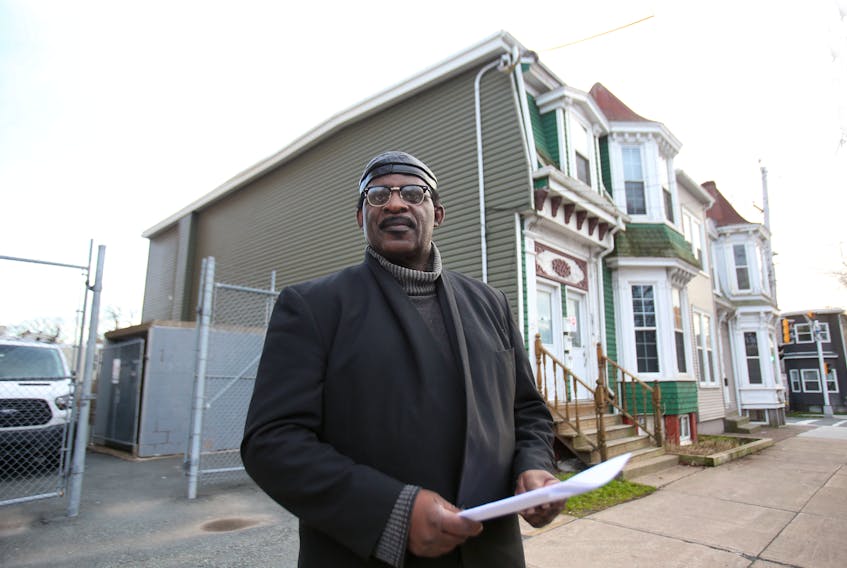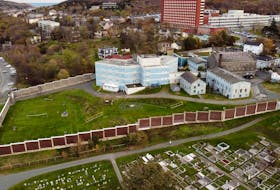It is character-less now, a wooden row-house that has seen better days, slowly being enveloped by 21st century Halifax “progress.”
Yet, even with the garbage on its front lawn and the steady stream of passing traffic on the way to Angus L. Macdonald Bridge, the ornate scroll-work at 5812 North St. hints that perhaps once this building was really something.
Once. when trolly cars ran down North Street, jazz could be heard in there, and Halifax’s black intellectuals hashed out Marcus Garvey’s notions of pan-Africanism and Black economic independence.
Once as well, Halifax’s first Black physician Clement Ligoure treated his patients in this house, which is now home to a trio of apartments.
But I would be lying by not admitting that I was on the North Street sidewalk mainly because of what happened inside the very same house 103 years ago next week, when the Imo and the Mont-Blanc collided in Halifax Harbour.
For all I knew I stood right where the carts stopped, and stretchers carrying the injured and wounded struggled up the stairs into the private hospital that Ligoure operated out of the same address.
“He was almost superhuman from the moment of the explosion,” said David Woods, the writer, artist, art historian and curator, who has been drawn to Ligoure’s story since first hearing of it back in the mid-1980s.
Testifying after the explosion Ligoure described his patients, who numbered in the hundreds, as “very severe cases, jaws cut, noses off. One hand hanging off.” At first the only assistance at the hospital that became the main dressing station during the disaster came from his housekeeper and a Pullman porter who boarded there.
Worked every day
And yet, according to Woods, after the Dec. 6, 1917, explosion Ligoure worked every day right up until the end of December, sometimes resting for just an hour or two a day. After his duties at the hospital were done, he would pack up his medical bag and go visit patients in their homes throughout the north end.
His selflessness was such that Ligoure didn’t charge patients a single cent for their treatment -- this was long before the modern public health system - - his only compensation being a few hundred dollars in gas money from the explosion relief commission.
The mistreatment of African-Nova Scotians in the aftermath of the Halifax Explosion is, by now, well-known. Woods, who has written a play about the importance of Ligoure and other Black Haligonians during the explosion, told me that the unsung quality of the doctor’s heroism was another disappointment in a life that had more than its share.
“His is the story of a very altruistic man who was betrayed every step of the way by racism and indifference,” said Woods.
When we spoke the other day, he laid out the broad-brush details of Ligoure’s life: how he was born in Trinidad and later immigrated to New York City. How he then headed to Kingston, Ont., to study medicine at Queen’s University, where he graduated in 1916, two years before the school enacted its 47-year-ban on Black medical students.
According to Woods, Ligoure moved to Halifax because he had been promised a role as the medical officer for the predominately-Black No. 2 Construction Battalion, which he helped form. At the last minute, though, the military brass denied him the position under a trumped-up rationale, giving it instead to the grandfather of singer Anne Murray.
Neglected hero
So Ligoure stayed in Halifax as the city’s first Black doctor, opening the Amanda Hospital on North Street. He also took over the publication of the Atlantic Advocate, the province’s first Black newspaper, for a friend who left to serve with the No. 2 Construction Battalion overseas.
The only picture I’ve seen of Ligoure shows a handsome man, with a neat, thin moustache. He immigrated at a late age, which meant he would have spoken with a Trinidadian accent. Everything Woods has learned about Ligoure indicates that, despite his accomplishments, his ego was in check.
His frustrations, though, had to be immense. With a year of taking it over the Advocate failed. A big reason, Woods said, was that the military used the paper extensively to recruit for the No. 2 Construction Battalion, but then wouldn’t pay their advertising bill.
Around that time Ligoure’s medical practice also failed, mainly because of his unwillingness to charge patients, even after the explosion.
Five years after the disaster Ligoure died, at just 32, with no fanfare.
Woods is determined to bring his story into the light. He had planned to stage a reading of his explosion play Extraordinary Acts next week, to coincide with the anniversary of the disaster, but COVID scuttled that notion.
He’s still hoping to mount a production in 2021. He also thinks that declaring the North Street house where the neglected hero of the Halifax Explosion showed such courage and compassion an historic site would be a nice touch too.









